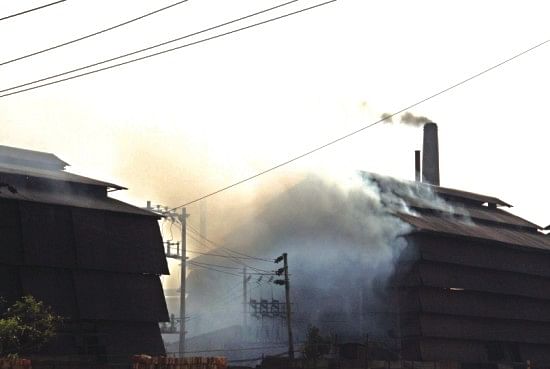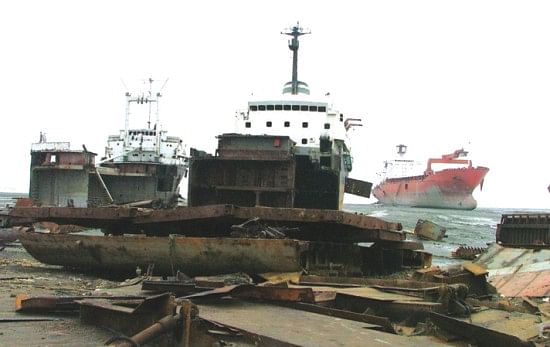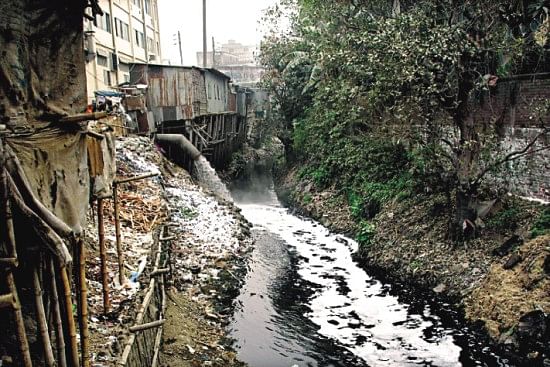| Environment
Tougher Laws for Better Lives?
Lusana Anika Masrur

On July 19th of this year, the government cabinet approved the draft of the Environment Court Act 2010, suggesting five years of imprisonment or penalties amounting to Taka 5 lakh as a part of a more concentrated campaign against environmental violators. "The cabinet has approved the Environment Act (amendment) 2010 to pave ways for intensified disciplinary actions against polluters," the Prime Minister's press secretary Abul Kalam Azad told journalists after the weekly cabinet meeting which had also approved of the draft of the Wildlife Act along with a number of other legislations.
Laws to curb pollution and protect our ecosystems and wildlife have been around for decades in Bangladesh, but have clearly, in effect, been in much vain. Under this proposal, members from the public will be able to file a case against offenders. For a country that has long been under the curse of environmental pollution from within its territory and one also at dire threat of extinction from climate change and its consequential sea-level rising, this legislation, even if rather overdue, is better late than never! The scheme will enable wider awareness among general citizens, private organisations and government bodies alike, which is a crucial and preliminary step for us as a nation to address the dangers coming our way.

The proposed law allows members of public to file a case against offenders.
The plan will also be introducing mobile environment courts in all districts, headquartered in Dhaka. Additionally, the cabinet has also approved the Bangladesh Wildlife (Preservation) Act 2010, integrating latest international convention and laws for protecting endangered species. Furthermore, by agreeing to sign the Memorandum of Understanding (MOU) for Cooperation on the Response to Oil and Chemical Pollution in the South Asian Seas Region, Bangladesh will be marking its contribution to growing global ecological concerns on the international forefront. Also, the cabinet approved, in principle, the Bangladesh Rubber Policy 2010 where the Prime Minister asked concerned officials to strictly enforce the policy and prohibit the misuse of land "in the name of rubber plantation". These moves are thoroughly crucial for the implications they hold for the long run. As a culture, we are, in general, thoroughly disconnected from our nature. By prioritising our need to protect it, the government has moved closer to putting this much important concern in the limelight.
However, as most aspects of our original Constitution and its respective amendments, there remains much scepticism about how effectively these policies will be regulated. For starters, since most penalties are likely to be directed at profit-making organisations, paying Taka 5 lakh for fines will most possibly, be a very insignificant fee that will not affect them much. Past history also provides a somewhat gloomy picture. For example, the Ministry of Environment and Forests (MOEF) undertook the St Martin's Biodiversity Conservation Project from 2001 to 2007 under a budget of Taka 13 crore, but with no sign of any avail. The reports from the Comptroller and Auditor General (CAG) in 2007 showed complete failure in the conservation of its aquatic species, in finding a marine park or setting up a research centre, all of which were meant to be core components of the project. The small 823 acre island, home to 182 land and marine species, have over the years been abused extensively from unfettered tourism and construction; and efforts falling short of addressing its ecological deterioration indicates how implementation of such projects cannot succeed in our system without rigid monitoring.

Under the proposed law the public can file cases against polluters.
Currently, according to a World Bank report, the country receives an appalling 1.5 million cubic metres of waste water daily from 7,000 industrial units, and 0.5 million cubic metres a day from other sources. As such, important water bodies like the heartland Buriganga river situated in our capital region have been literally converted into a waste dump over the years, where a shocking 80 percent of the toxic sewage that flows into it, is left untreated. Not only is this terribly damaging to surrounding ecosystem, it poses serious health hazards to nearby settlers. For concerned naturalists, and especially the villagers, the passing of these bills could potentially provide for a far more outreaching preservation of its adjacent environment and better and safer living conditions for the residents of the many rural areas lining its banks.
The Prime Minister recently rejected the Shipping Minister's controversial appeal for exterminating monkeys who were supposedly being a nuisance in his hometown in the Madaripur district, as well as the Information Minister's plea in killing Indian wild elephants that damage crops in the bordering districts. On many levels, these events exemplify how much we remain in the dark as a society when it comes to environmental awareness. And the government's role in remaining adamant by taking a conservationist stand, deserves much applaud and creates hope for better environmental practices in the long-run. It illustrates lessons about tolerance and living in harmony with other species that our territory is also home to.

There may be hope for greater protection of wildlife in the future.
The United Nations has declared 2010 as the International Year for Biodiversity and the MOEF is playing a pivotal role as a participant of the UN's programme with the assistance of the government administration. As a developing country that has a long way to go, the environment is not something we can compromise on our path to economic and social development, because inevitably, these foundations are all intertwined on our united journey to further progress. In order to achieve such sustainable and collective development, it is we, the people, who must alongside, come forward in acknowledging the government's efforts and partake in educating ourselves about this issue as well as engage in active discipline to accept and respect our environment and ecosystems.
Copyright
(R) thedailystar.net 2010 |
|
